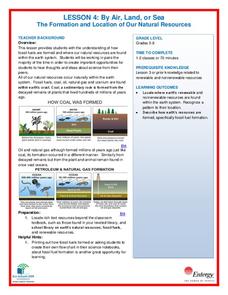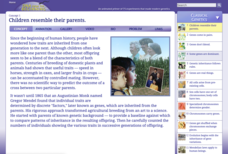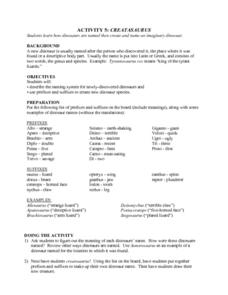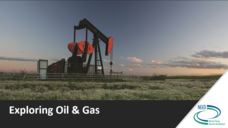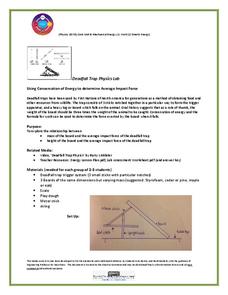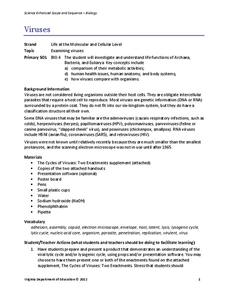National Wildlife Federation
By Air, Land, or Sea: The Formation and Location of Our Natural Resources
Coal forms from the ancient remains of plants that were alive on Earth before the dinosaurs! Scholars use their t-charts from the previous lesson plan over resources and research to determine if their information is correct. Through...
Howard Hughes Medical Institute
Mass Extinctions Interactive
Extinctions constantly occur, but what sets off a mass extinction event? Young scientists study the data from the previous five mass extinctions to better understand their causes. Then, they learn the impact each extinction had on our...
Kenan Fellows
Unit 1: Introduction to Biotechnology
Biotechnology is big! Introduce the uses of biotechnology to science scholars with a fascinating, fact-filled unit. The first installment in a series of four biotechnology units covers the role biotechnology plays in human and...
Cold Spring Harbor Laboratory
Children Resemble Their Parents
Gregor Mendel's work revolutionized agriculture from an art to a science. Explore Mendel's work with an interactive lesson that includes animations, video, and practice problems. The instruction describes the early discoveries that...
Curated OER
Salt of the Earth: A Caddo Industry in Arkansas
Middle schoolers explore the history of the Caddo Salt Industry found in Arkansas. Along with learning about how salt deposits formed in Arkansas, learners study the process of salt production and how valuable salt is as a natural...
Curated OER
Creatasaurus
Upper elementary children still are intrigued by dinosaurs. Here is a dinosaur lesson that is geared toward their age group! The learners consider a list of prefixes and suffixes. Using the list, they can analyze the names of their...
Curated OER
Intoxication: In the Arms of Morpheus
A comprehensive instructional activity that takes a look at psychoactive plants with this one focusing on the opium poppy. Information about the history, culture, use, source and effects are discussed. There are weblinks to reliable...
National Energy Education Development Project
Exploring Oil and Gas
The United States consumes more oil than any other country, about 1.85 billion barrels (or 77 billion gallons) a day. Viewers learn about the history of fossil fuel exploration and how they are formed in an informative presentation. They...
American Museum of Natural History
Layer of Time
Dig through the layers for a better understanding of fossils. Scholars learn that fossils form in layers of sedimentary rock. Pupils arrange virtual layers to show the fossil record of different species. Once the layers are correct, they...
Curated OER
Severe Weather is Spring Challenge
Middle schoolers research severe weather history in their hometowns, interview local meteorologist to find out their suggestions for disaster preparedness, inquire as to local school district's emergency plan, and create poster or Public...
Agriculture in the Classroom
Growing a Nation (1950-1969): Prosperity & Challenges: The Story of American Agriculture
A wonderful lesson on the development and impact of mechanized farming! History or agriculture classes learn the historical background of the United States' food production by creating a pamphlet with information on the cause and effect...
Agriculture in the Classroom
Growing a Nation: Into a New Millennium 1970-Present
If you want to focus on critical thinking skills, this well-constructed series of activities will challenge your history or agriculture class to evaluate the effectiveness of administrative decisions related to agricultural and the...
Curated OER
Plate Tectonics - Evolution of the Earth
Tons of photographs, diagrams, animations, and satellite images fill the slides of an education earth science presentation. It begins with volcanic activity and earthquakes, and then moves into plate tectonics, boundaries, and driving...
American Chemical Society
Isolation of Phytochrome
Why do soybean plants that are planted weeks apart in the spring mature simultaneously in the fall? Four independent activities cover the history of phytochrome research, scientist collaboration, the electromagnetic spectrum, and...
University of Saskatchewan
Using Conservation of Energy to Determine Average Impact Force
Explore the center of gravity with your science class as they create a deadfall trap with common materials. They research the concepts of energy conservation and gravitational force before dividing into small groups to create a model of...
Cornell University
Constructing and Visualizing Topographic Profiles
Militaries throughout history have used topography information to plan strategies, yet many pupils today don't understand it. Scholars use Legos and a contour gauge to understand how to construct and visualize topographic profiles. This...
Nuffield Foundation
Investigating Factors Affecting the Breathing Rate of a Locust
Do animals breathe faster when given more oxygen or more carbon dioxide? Young scientists observe the respiration rates of locusts under a variety of gas concentrations to answer that very question. They collect data, analyze the...
Curated OER
Fossil Fuels (Part II), The Geology of Oil
More of a mini-unit than a lesson, these activities lead inquisitors through a survey of oil deposits. In the first part, they read about and view diagrams of sedimentary rock layers that trap oil. Next, they test porosity and...
Curated OER
On The Road Again: Cars, Culture, and Change Along Historic U.S. Highway 67
Middle and high schoolers look at historical photos and analyze some of the changes brought about by the automobile revolution in Arkansas during the 1920's. The book, A Journey Through Arkansas: Historic U.S. Highway 67, is used for...
Curated OER
Not Everyone Lived in Castles During the Middle Ages
Students complete a variety of online activities surrounding their study of the Middle Ages. They focus on the various levels of the class sytem and then role play a member of a given class.
Virginia Department of Education
Viruses
Germs, parasites, and viruses, oh my! Facilitate a lesson on viruses as individuals explore functions of Archaea, Bacteria, and Eukarya. They learn how viruses compare with other organisms in nature and how they contribute to health...
Curated OER
Earth Movements
In this earth science worksheet, middle schoolers use the sheet for reinforcing vocabulary and core concepts. The answers are found and reviewed for the attainment of new knowledge.
Curated OER
Science in the Past
Students research the science of ancient Native American people. They compare native science to the present time. They create a project that they can present to their classmates. The project could be a report, poster, Power Point...
Curated OER
Notes on the Screw
In this notes on the screw worksheet, 5th graders read 3 paragraphs about the screw, its history and uses, then write the main points of each paragraph in the right hand column.
Other popular searches
- History of Science
- History of Science Museums
- The History of Science
- History of Science Nuclear
- History of Science Physics
- History of Science Georges
- History and Nature of Science
- History and Social Science
- History Social Science
- Ancient Science Inventions
- History and Science Fiction
- History of Forensic Science


